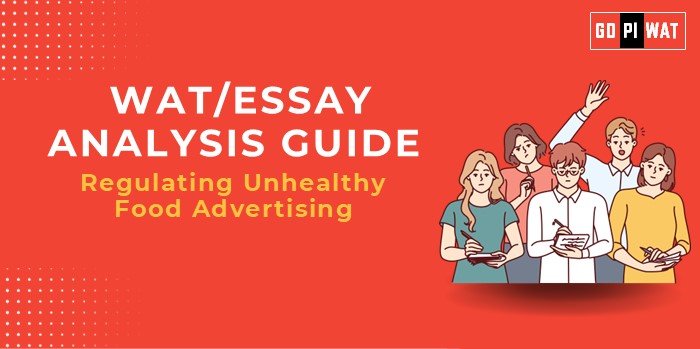📋 WAT/Essay Analysis Guide
🌟 Understanding the Topic’s Importance
This essay explores the intersection of public health, corporate ethics, and consumer rights. For B-schools, it highlights the role of business and government in shaping societal outcomes.
📝 Effective Planning and Writing
- Time Allocation: Planning: 5 minutes, Writing: 20 minutes, Review: 5 minutes.
- Preparation Tips: Research existing laws, understand the marketing dynamics, and identify relevant statistics.
✍️ Introduction Techniques for Essays
- Contrast Approach: “While sugary drinks and junk food contribute to the obesity epidemic, their advertisements flood prime-time slots, raising ethical and policy concerns.”
- Solution-Based Approach: “Regulating food advertising isn’t just a health initiative; it’s a societal obligation to protect vulnerable populations.”
📚 Structuring the Essay Body
- Achievements: Include global success stories like Chile and the UK.
- Challenges with Comparative Analysis: Discuss regulatory gaps, economic pushback, and enforcement challenges.
- Future Outlook: Suggest collaborative frameworks and innovative solutions like responsible advertising pacts.
🔚 Concluding Effectively
- Balanced Perspective: “Advertising restrictions alone won’t curb lifestyle diseases; a multi-pronged approach combining education, regulations, and industry partnerships is essential.”
- Global Comparison: “Countries like Chile show the path forward, blending advertising restrictions with consumer education to achieve tangible health benefits.”
📊 Analyzing Successes and Shortcomings
- Key Achievements: Reduced sugar consumption, ethical advertising momentum.
- Ongoing Challenges: Regulatory circumvention, mixed effectiveness data.
- Global Context: Compare progressive models like the UK with gaps in self-regulation in the US.
💡 Recommendations for Sustainable Progress
- Strengthen laws with clear definitions of unhealthy food.
- Partner with media platforms for ethical advertising practices.
- Enhance public awareness campaigns.
✏️ Sample Short Essays
Balanced Perspective:
“Restricting unhealthy food advertisements safeguards public health but must align with economic freedoms for sustainable impact.”
Solution-Oriented:
“Combining restrictions with public awareness can significantly shift consumer behaviors toward healthier choices.”
Global Comparison:
“Chile and the UK illustrate the transformative potential of advertising regulations when supported by robust implementation and education.”


